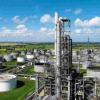|
|
Solubility Of Hydrogen Sulfide In Petroleum
#1

Posted 13 February 2019 - 01:12 AM
#2

Posted 13 February 2019 - 02:15 PM
Use
API Technical Data Book
or
GPSA Engineering Data Book
#3

Posted 14 February 2019 - 12:25 AM
Use
API Technical Data Book
or
GPSA Engineering Data Book
Henry’s Constant only for water.
#4

Posted 14 February 2019 - 04:44 PM
Once again:
Use
API Technical Data Book
or
GPSA Engineering Data Book
#5

Posted 14 February 2019 - 07:39 PM
To reinforce PingPong's response, my old copies of the API Technical data book and the GPSA engineering data books (1980 and 1966, I think they are) both have procedures (as K values=vapor mole fraction/liquid mole fraction) for determining the VLE of H2S in hydrocarbons. Make sure you are looking in the right place for the procedures in those data books.
If you found Henry's constants for a variety of fluids, you might look at which fluids you have, and see if any of those data will allow you to at least make a guess at the Henry's constant or activity coefficient for H2S in hydrocarbons. My sources suggest that there is at least some well known and commonly referenced data for H2S in decane and pentane that might be useful for such an undertaking.
#6

Posted 15 February 2019 - 01:28 AM
Hi,
In addition to the previous answers :
- Let you try with your favorite search engine , key words H2S solubility in oil .
https://pubs.acs.org...rnalCode=jceaax
- Carl L Yaws and coll . handbooks could be a resource to support your work.
Good luck
Breizh
Edited by breizh, 15 February 2019 - 02:06 AM.
#7

Posted 15 February 2019 - 02:48 AM
To reinforce PingPong's response, my old copies of the API Technical data book and the GPSA engineering data books (1980 and 1966, I think they are) both have procedures (as K values=vapor mole fraction/liquid mole fraction) for determining the VLE of H2S in hydrocarbons. Make sure you are looking in the right place for the procedures in those data books.
I wanted to have a simple method for determining the partial pressure of hydrogen sulfide at concentrations of about 10-1000 ppmw.
I found information about VLE of H2S in hydrocarbons in the API and the GPSA (new version).
But I consider making the calculations VLE an unnecessary complication in my case.
So I asked Henry’s Constant.
If you found Henry's constants for a variety of fluids, you might look at which fluids you have, and see if any of those data will allow you to at least make a guess at the Henry's constant or activity coefficient for H2S in hydrocarbons. My sources suggest that there is at least some well known and commonly referenced data for H2S in decane and pentane that might be useful for such an undertaking.
Search and use of analogs, make a guess, this cannot be called a simple and universal method.
Hi,
In addition to the previous answers :
- Let you try with your favorite search engine , key words H2S solubility in oil .
https://pubs.acs.org...rnalCode=jceaax
- Carl L Yaws and coll . handbooks could be a resource to support your work.
Good luck
Breizh
Of course I used Google.
I've already seen "Solubility of Total Reduced Sulfurs.." but there is no information for fractions, only for individual hydrocarbons
Carl L Yaws - Henry's Law Constant for Compound in Water
I found a correlation in "Three-Phase Reactor Model of Hydrotreating in Pilot Trickle-Bed Reactors" Hans Korsten and Ulrich Hoffmann, May 1996
a, = exp(3.3670-0.008470*T).
But according to calculations, I get an error 1000 times. Probably a question with dimensions
#8

Posted 15 February 2019 - 03:37 AM
The beauty of K-values is that they are dimensionless.
There is a very simple relation between K and H, which you should know.
Otherwise I suggest you dig up your old college textbook.
#9

Posted 17 February 2019 - 10:41 PM
The beauty of K-values is that they are dimensionless.
There is a very simple relation between K and H, which you should know.
Otherwise I suggest you dig up your old college textbook.
Of course, the formula is simple, but a total vapor pressure is required. And we come back to the necessity of calculating VLE. But I want to avoid it.
#10

Posted 18 February 2019 - 04:06 AM
You don't need to do complicated VLE calculations.
A value for total absolute pressure P is required but normally that is known.
But even if it is not known you can simply assume a value for P to determine H.
For example, using the graph in GPSA EDB, the K-value for H2S in hydrocarbons is:
K = 32 at P = 1 bar & 38 oC
K = 3.2 at P = 10 bar & 38 oC
So at 1 bar Henry constant H = 32 * 1 = 32 bar at 38 oC
and at 10 bar Henry constant H = 3.2 * 10 = 32 bar at 38 oC
It makes no difference what P is because K is inversely proportional to P as long as P is not too high (see graph).
In other words: only at very high pressures H is dependent on P.
#11

Posted 18 February 2019 - 05:51 AM
#12

Posted 19 February 2019 - 02:59 PM
Try also API method.
Pressure in vessel is usually known, or at least approximately.
Whether the gas above the liquid in the vessel is nitrogen, or HC gas, or liquid vapor, is irrelevant for this calculation.
It is not clear what you mean, or want.
#13

Posted 25 February 2019 - 12:39 AM
"Pressure in vessel" at low concentrations of hydrogen sulfide does not affect the partial pressure of hydrogen sulfide. Therefore, "pressure in vessel" is not required and not necessary for a universal method of calculation.
For example, the partial pressure of hydrogen sulfide will not change if the nitrogen pressure in the tank doubles (0 barg-> 1 barg)
Edited by alextor, 25 February 2019 - 01:01 AM.
Similar Topics
Heat Of Dilution Of Hydrogen Chloride In Hydrochloric Acid Solution (3Started by Guest_fredlan54_* , 21 Nov 2025 |
|

|
||
Handling Of Mixed Or Leaky Petroleum BowserStarted by Guest_Noman97_* , 18 Aug 2025 |
|

|
||
Design Capacity Of Hydrogen Pullet During Hydroprocessing Units UpsetStarted by Guest_Divid Kelin_* , 18 Jun 2025 |
|

|
||
Cosi2 And HydrogenStarted by Guest_Xanthophyll_* , 17 Oct 2024 |
|

|
||
Hydrogen Storage Tank Depressurization Duration - For Maintenance!Started by Guest_panagiotis_e_* , 11 Jul 2024 |
|

|

 FB
FB







